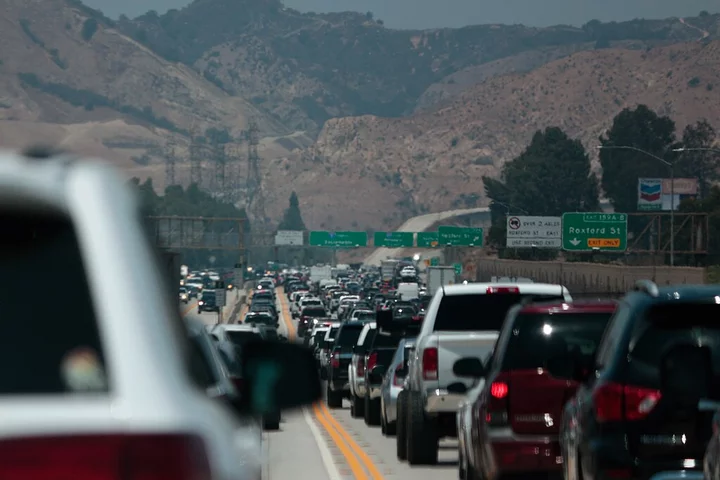JPxG, CC BY-SA 4.0, via Wikimedia Commons
PREVIOUSLY:
###
This story was originally published by CalMatters. Sign up for their newsletters.
###
Drivers in Los Angeles County have a powerful new privacy advocate after the Board of Supervisors pushed to restrict how their license plates are scanned by law enforcement.
The board recently voted to ask the Sheriff’s Department to more stringently regulate its use of the license plate data it collects through high-tech camera systems mounted on patrol cars and above roads. The measure it approved cited reporting from CalMatters that roughly a dozen police and sheriff’s departments throughout Southern California shared such data with federal immigration agencies.
The September motion requests that the L.A. County Sheriff’s Department, which operates independently from the supervisors, conduct yearly privacy training for deputies with access to license plate cameras and that the data not be used for non-criminal immigration enforcement.
It also requests the department delete plate sightings after 60 days unless they are flagged on criminal lists.
The Sheriff’s Department “welcomes” the motion and plans to review its practices and policies, the department told CalMatters. Per the motion, deputies are to report their license plate reader policy changes to the county by January. It told the Los Angeles Times last month that it operates 931 automated readers.
Depending on the result of that report and whether Sheriff Robert Luna decides to follow the board’s direction, said Supervisor Hilda Solis, who was lead author of the legislation, supervisors may take additional action to further regulate license plate readers in L.A.
The sheriff’s department told CalMatters it has no “current” arrangements for sharing license plate data with federal agencies. A California law enacted in 2015 prohibits the sharing of plate data with out-of-state and federal entities, and requires agencies that use plate readers to have a usage and privacy policy for them.
Many of the regulations in the L.A. County motion mirror those in a piece of statewide legislation vetoed by the governor earlier this month. That measure, Senate Bill 274, sought to prevent misuse of license plate data by limiting the lists of license plates law enforcement can track and by requiring police to detail a specific case or task force use when they use data from the cameras.
Solis said she put forward her motion in part because she wanted to publicly support SB 274 before Newsom decided on it.
CalMatters did not find that the L.A. County Sheriff’s Department shared data with ICE or the Border Patrol, but some Los Angeles area agencies did. The Los Angeles Police Department declined to comment when asked about such sharing.
License plate readers “remain a powerful investigative tool for recovering stolen vehicles, identifying violent crime suspects, and finding missing persons,” supervisors wrote in a September letter urging the governor to sign SB 274 into law. But “its public support depends on confidence that the sensitive location data it generates will never be repurposed for impermissible civil immigration enforcement.”
Board Chairperson Kathryn Barger cast a lone “nay” vote against endorsing SB 274. Barger disapproved of the proposed limit on the time frame over which law enforcement agencies could retain plate data.
Barger told CalMatters she believes this time limit would have endangered the public and made it harder for police to solve crimes, and that she supports Newsom’s veto. Newsom also opposed a 60-day data retention limit in the state bill, citing similar reasons.
But that’s the same license plate data retention period followed by the California Highway Patrol, and last year the governor’s office called a 28-day retention period a balance between public safety and privacy.
“When so many of our neighbors live in fear, sharing sensitive data only increases risks.”
— Eunisses Hernández, Los Angeles City Councilmember
The L.A. County Board of Supervisors has made immigration issues a priority, fast-tracking both the license plate motion and another requesting a report on progress using new state laws to protect schools from ICE raids.
The county motion does not apply to police departments such as LAPD since they are governed by local city councils. The Los Angeles City Council has acquired about $400,000 worth of license plate reader technology for LAPD since June.
Two Los Angeles city councilmembers, Eunisses Hernández and Hugo Soto-Martínez, consistently vote against the police department’s use of license plate readers, citing concerns over their use in immigration enforcement.
“At a time when so many of our neighbors live in fear, sharing sensitive data only increases risks and erodes confidence,” Hernández wrote in a statement to CalMatters.
Law enforcement agencies using automated license plate readers throughout the state continue to break the law.
California Attorney General Rob Bonta filed a lawsuit against the El Cajon Police Department earlier this month for violating state law. Reporting by KPBS earlier this month found that this includes federal agencies like ICE. The attorney general’s office has also sent letters to 18 agencies statewide since 2024 for potential violations of state law.
Following CalMatters reporting in June, subsequent reporting by Palo Alto Online and the San Francisco Standard found that police departments in Atherton, Menlo Park, and San Francisco violated state law. In the wake of that reporting, last month Jennifer Wall, a city council member in the Bay Area city of Woodside, called on the San Mateo County Sheriff’s Office to be more transparent about how deputies conclude that searches included in quarterly reports to the council comply with local policy.
When municipalities use automated license plate reader technology, “we need to make sure it’s used appropriately and mechanisms [are] in place to ensure it’s used appropriately,” she told CalMatters. “There has to be accountability for how they’re used.”

CLICK TO MANAGE